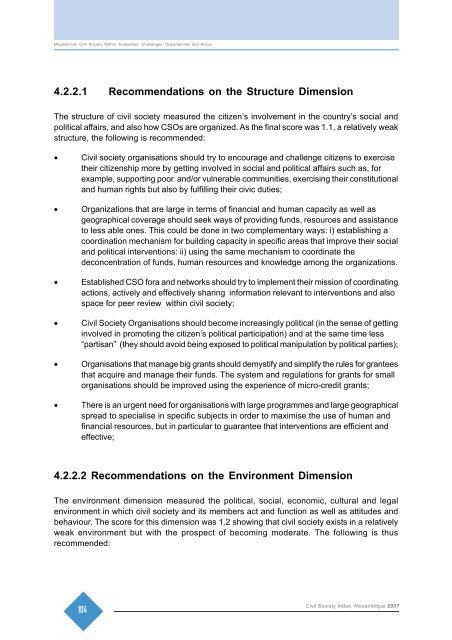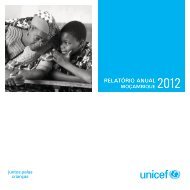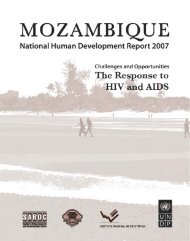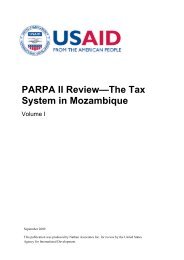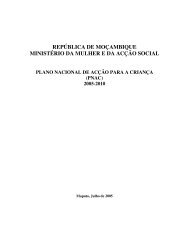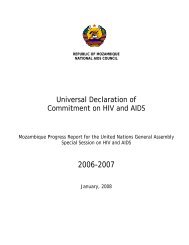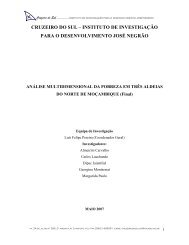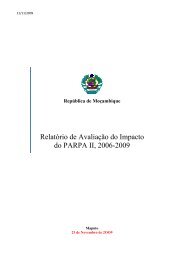Mozambican Civil Society Within: - UNICEF Mozambique - Home page
Mozambican Civil Society Within: - UNICEF Mozambique - Home page
Mozambican Civil Society Within: - UNICEF Mozambique - Home page
Create successful ePaper yourself
Turn your PDF publications into a flip-book with our unique Google optimized e-Paper software.
<strong>Mozambican</strong> <strong>Civil</strong> <strong>Society</strong> <strong>Within</strong>: Evaluation, Challenges, Opportunities and Action<br />
4.2.2.1 Recommendations on the Structure Dimension<br />
The structure of civil society measured the citizen’s involvement in the country’s social and<br />
political affairs, and also how CSOs are organized. As the final score was 1.1, a relatively weak<br />
structure, the following is recommended:<br />
• <strong>Civil</strong> society organisations should try to encourage and challenge citizens to exercise<br />
their citizenship more by getting involved in social and political affairs such as, for<br />
example, supporting poor and/or vulnerable communities, exercising their constitutional<br />
and human rights but also by fulfilling their civic duties;<br />
• Organizations that are large in terms of financial and human capacity as well as<br />
geographical coverage should seek ways of providing funds, resources and assistance<br />
to less able ones. This could be done in two complementary ways: i) establishing a<br />
coordination mechanism for building capacity in specific areas that improve their social<br />
and political interventions: ii) using the same mechanism to coordinate the<br />
deconcentration of funds, human resources and knowledge among the organizations.<br />
• Established CSO fora and networks should try to implement their mission of coordinating<br />
actions, actively and effectively sharing information relevant to interventions and also<br />
space for peer review within civil society;<br />
• <strong>Civil</strong> <strong>Society</strong> Organisations should become increasingly political (in the sense of getting<br />
involved in promoting the citizen’s political participation) and at the same time less<br />
“partisan” (they should avoid being exposed to political manipulation by political parties);<br />
• Organisations that manage big grants should demystify and simplify the rules for grantees<br />
that acquire and manage their funds. The system and regulations for grants for small<br />
organisations should be improved using the experience of micro-credit grants;<br />
• There is an urgent need for organisations with large programmes and large geographical<br />
spread to specialise in specific subjects in order to maximise the use of human and<br />
financial resources, but in particular to guarantee that interventions are efficient and<br />
effective;<br />
4.2.2.2 Recommendations on the Environment Dimension<br />
The environment dimension measured the political, social, economic, cultural and legal<br />
environment in which civil society and its members act and function as well as attitudes and<br />
behaviour. The score for this dimension was 1.2 showing that civil society exists in a relatively<br />
weak environment but with the prospect of becoming moderate. The following is thus<br />
recommended:<br />
104<br />
<strong>Civil</strong> <strong>Society</strong> Index, <strong>Mozambique</strong> 2007


